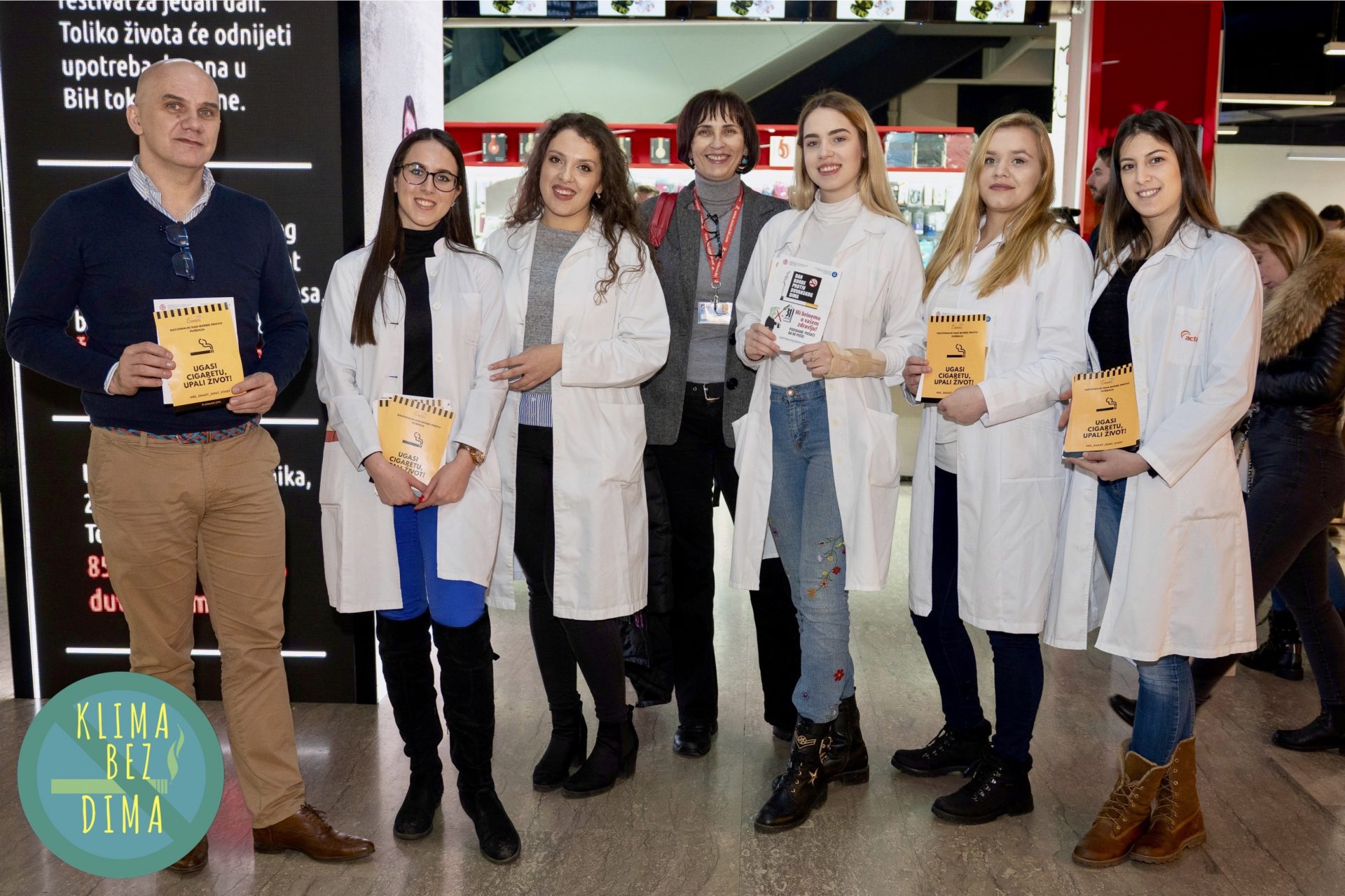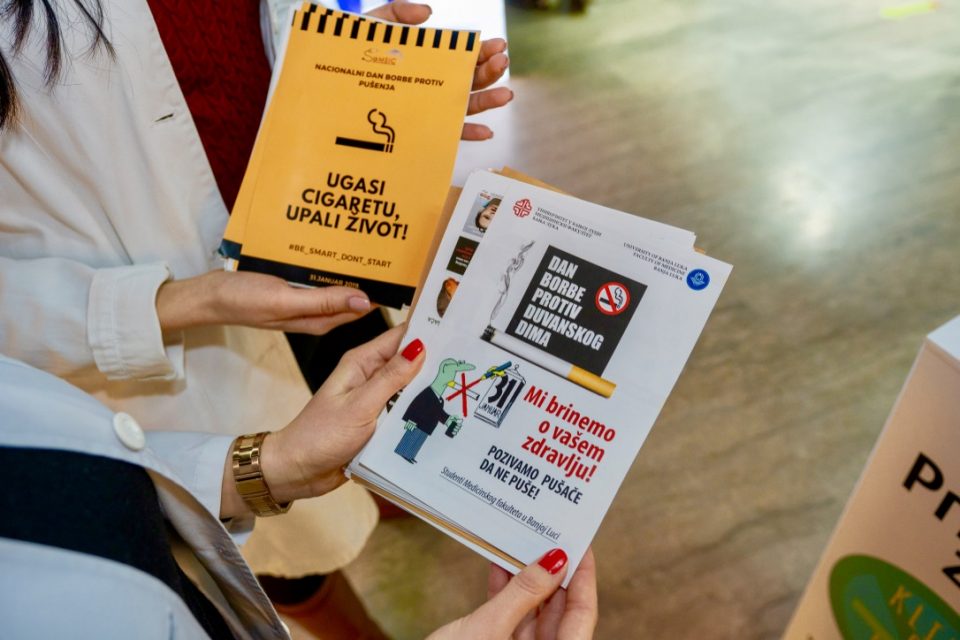
Tobacco came to Europe in the 16th century. In the beginning, only members of the upper class, predominantly men, had access to it. Nowadays, however, it is available across the globe and is easily accessible to anyone and everyone.
Tobacco is one of the primary ingredients in a cigarette, which also contains tar and seven thousand other substances that are harmful to humans and the environment. The victims of tobacco smoke’s harmful effects are not just the smokers, but the people around them who inhale the smoke coming from the cigarette as well as the smoke that is exhaled out of the smokers’ mouth.
The negative impact that cigarettes have on human health was noticed since the early 20th century, however, there are still many countries around the world that have yet to take any measure to reduce people’s exposure to air that is contaminated with tobacco smoke. One of those countries is Bosnia and Herzegovina (BiH). Unlike developed European countries or the United States, smoking in public, indoor spaces is still permitted in BiH. Such conditions directly endanger both the smokers as well as the non-smokers who have no other option but to inhale contaminated air.
In an effort to change this country’s current situation and make our environment healthier, the initiative “Klima Bez Dima” was launched. As part of this initiative, a series of educational and informational events have been organized across the country, one of which was held on January 31st, or No Tobacco Day, in Banja Luka. The event, titled “A Life in Smoke: Save Me!” was attended by students from the University of Banja Luka’s Faculty of Medicine, young singers from the MaMa Vox Music School, and Banja Luka citizens who, alongside the event’s organizers, shared their opinions on this important topic.

“Unfortunately, I am constantly exposed to tobacco smoke. I am not a smoker. I do not smoke, and my husband stopped smoking four years ago at the behest of me and our daughter, so we’ve helped him. In the interest of our children, I would really love to see this initiative grow,” says Mirjana (43) from Banja Luka.
Zoran (51), another concerned parent, agrees: “Most of the parents support this initiative and I believe it will be successful.”
Nataša (37), an attendee of the event, explains: “The thing that bothers me the most is the smoke in public places, especially in the shopping malls where there are no smoke-free areas you can take your children to avoid exposure. Unfortunately, our children are constantly exposed to contaminated air and there is no way for us to protect them. I sincerely hope this initiative will catch on. I will be giving my support and I really hope others will also.”
The greatest concern regarding this issue was shown by parents who, even if they are not cigarette or tobacco product consumers, are unable to prevent their children’s exposure to second-hand smoke. Young people typically grow accustomed to the smoke and, thus, do not give the issue too much significance.
Srđan (24) says: “I’ve been to countries where smoking in public places is prohibited. Here, it doesn’t bother me because pretty much everyone around me smokes, but it’s undeniable that this has a bad influence on our health. This is why I support the initiative to reduce tobacco smoke in public places.”
We asked student of medicine, Tatjana Grabovac, for her professional opinion about the health impacts of smoking and exposure to second-hand smoke. She responded: “Tobacco smoke is extremely harmful and leads to an increase in cancer cases, especially lung cancer. In addition to cancer, smoking and exposure to tobacco smoke can negatively affect other organs and systems of the body, which can lead to a variety of health issues such as cardiovascular disease, impotence in men, pregnancy complications in women, and even blindness.”

Tatjana explains that, although nobody in her immediate company smokes, she is still constantly surrounded by tobacco smoke when she goes out to clubs or coffee places with her friends. “We need to draw attention to the fact that you unwillingly become a passive smoker as a result of continued and prolonged exposure to second-hand smoke, which increases your risk of illness. Klima Bez Dima and similar initiatives incorporate an educational component that aims to get people to start thinking more deeply about their life decisions as well as to motivate them to make the ultimate decision to quit smoking.”

Smoking is an addiction that has plagued our society for over five centuries. According to the World Health Organization (WHO), more than 5 million people die worldwide each year as a direct consequence of active smoking, while an additional 500 thousand deaths can be directly linked to the effects associated with exposure to second-hand smoke. Tobacco kills more people than tuberculosis, HIV/AIDS, and malaria combined, and, according to estimates, more than 1 billion people will die of tobacco-related illnesses over the course of the 21st century if appropriate measures are not taken.
Tatjana says that smoking should be viewed as “one of the risk factors that we ourselves can prevent, thus reducing the likelihood of cancer and other related illnesses. We control the strings, and we all deserve a long and healthy life.”
Klima Bez Dima is part of the “Reducing Health Risk Factors in BiH” project supported by the Government of Switzerland and implemented by the World Bank in BiH in partnership with entity Ministries of Health, entity Public Health Institutes, and other local stakeholders. To learn more about the Klima Bez Dima initiative and to sign the pledge to protect BiH citizens from exposure to second-hand smoke, visit www.klimabezdima.com.







